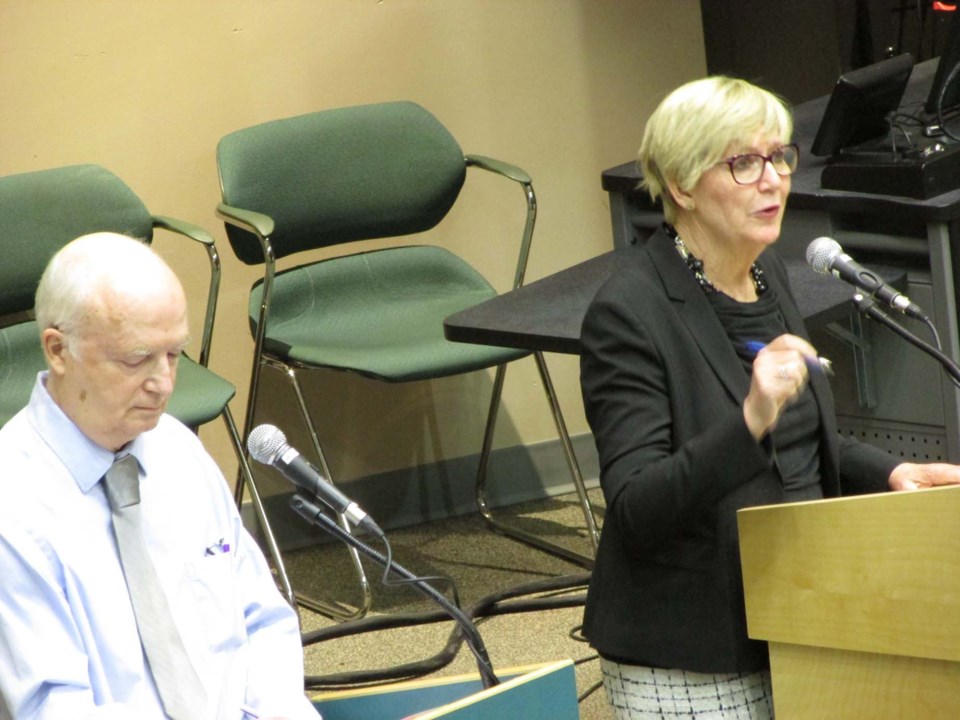Saturday's debate on proportional representation versus the first past the post system saw almost 200 people taking their seats in Canfor Theatre at UNBC.
The government of BC announced the electoral system referendum with mail-in voting taking place between Oct. 22 and Nov. 30, which prompted the university and the Prince George Chamber of Commerce to partner in hosting the debate with Peter Ewart, a local columnist and writer; community activist and spokesperson for the Stand Up for the North committee, representing Fair Vote BC and the Hon. Suzanne Anton, Q.C., a former MLA for Vancouver-Fraserview and former Attorney General and Minister of Justice, representing the No BC Proportional Representation Society.
"It is vitally important that the electorate become knowledgeable on the formats for electing political parties and MLAs in our province," Todd Corrigall, chamber CEO, said in a recent press release. "Changes to our electoral system must be fully vetted and delivered in a way that provides the greatest access and accountability of elected officials. BC has twice undertaken this process. However, the current referendum will be a mail-in ballot, which traditionally yields low voter turnout."
The first part of the debate saw each of the debaters offer opening remarks before being asked questions provided by moderator Gary N. Wilson, with a limited time to answer. Then the floor was open in a traditional Q&A period where members of the audience could ask questions.
Explaining why first past the post procedure is not ideal Ewart said that a monopoly government did not best serve its people.
"Proportional representation will top up and balance out seats in our region so we'll always have a mix of government and opposition MLAs to speak out and break out the big party monopolies," Ewart said. "Our votes will no longer be wasted. They will count."
In response Anton talked about the value of keeping local MLAs local because they are invested in their community. Anton talked about how the local MLAs advocated for the creation of the BC Cancer Society's Centre for the North and how it was put in place.
"Do you think when someone came into their office - do you think they asked them if they were NDP or a Liberal or a Green?" Anton asked. "They don't care."
She went on to say local MLAs are non-partisan and work hard for all constituents.
"That's what you give up under proportional representation," Anton said. "You will give up local MLAs."
As debates go Ewart did have a response to that and said several times during the event that what Anton said was a fairy tale.
As the debate carried on both points were driven home and finally the floor was opened to questions from the audience.
When Ewart was asked what choice he would make of the three options for proportional representation and why, he deferred by saying he would encourage everyone to study all three and pick one of the three and bypass a vote for first past the post.
In the meantime, Anton responded by saying that first past the post sees the person, not the political party to which they are affiliated.
"And that's the fundamental difference," Anton said.
A lot of discussion came up about the details of the three options of proportional representation and those details, Ewart said, would be fleshed out after the vote.
"There are no maps, no indications of how many districts there will be, no indications of how many regions there will be," Anton said and added there is also no indication of how many people will be elected in each district or region.
Ewart stated that with proportional representation if a party should get 30 per cent of the votes, it would get 30 per cent of the seats.
Closing remarks included each debater asking for the audience to vote for their cause.
"We have a very strong, stable government system in British Columbia," Anton said. "There is no reason to change the way we vote."
Ewart once again reminded Anton about the fairy tale she just spoke about and added his opinion.
"Proportional representation is more democratic and every vote will count," Ewart said.
For more information about proportional representation visit fairvote.ca and for more information about first past the post visit nobcprorep.ca.



